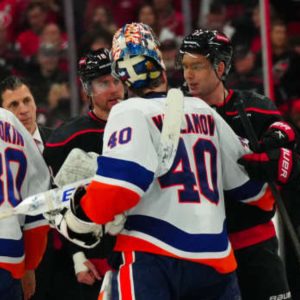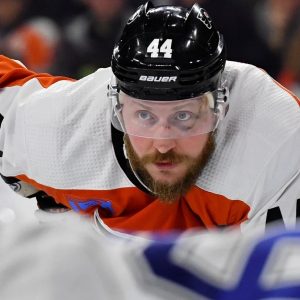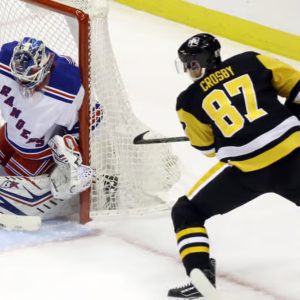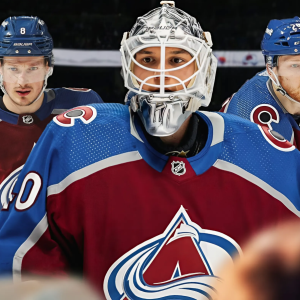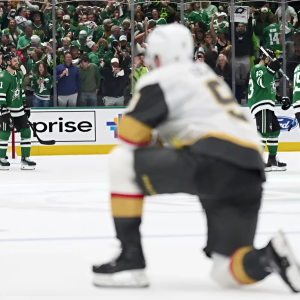Entering the third season of a four-year contract, 33-year-old enforcer Nicolas Deslauriers is what he is for the Philadelphia Flyers at this point. He loves to fight, hit, and won’t back down to anyone. With that being said, the Flyers should consider scaling back his involvement in 2024-25.

The Flyers Played Much Worse with Deslauriers
Deslauriers only played 489 minutes with the Flyers last season, which admittedly isn’t very much. But when he was on the ice, much like your average enforcer, Philadelphia played significantly worse hockey. Scoring just four points in 60 games and putting up a minus-7 rating, that much is somewhat obvious by looking at the basic numbers. The advanced stats don’t do him any justice, either.
Now, Deslauriers didn’t have a massive impact or anything, but the numbers still aren’t very good. Let’s look at the Flyers’ ranks in expected goals percentage (xGF%), Corsi percentage (CF%), and goals percentage (GF%) at 5-on-5 in three different areas. We’ll check out their totals in the previous stats without Deslauriers, their standard numbers with no restrictions applied, and only with him on the ice. Their ranks in the metrics among the 32 NHL teams are listed in the last column of the table.
| Stat (5-on-5) | Without Deslauriers | Standard | Only with Deslauriers | Rank (All 32 Teams) |
| xGF% | 53.4 | 52.4 | 44.0 | Fifth, Seventh, 30th |
| CF% | 52.4 | 51.6 | 45.4 | Seventh, Eighth, 30th |
| GF% | 47.6 | 46.9 | 37.5 | 24th, 27th, 30th |
The Flyers were only slightly better when Deslauriers was out of the equation versus just in general, but those improvements are essential for a team barely outside of the postseason trying to get in. Of course, when we isolate the enforcers’ minutes, the Flyers are one of the worst teams in the NHL across the board. The most interesting part about it is that Philadelphia’s depth was actually very good—he was playing with good linemates, not bad ones.
I’ve seen the stat that the Flyers had a 29-22-9 with Deslauriers versus a 9-11-2 record without him a few times, but that’s misleading for a lot of reasons. More than half of those games where he was absent came when the wheels were falling off the wagon for the Orange and Black at the end of the season—he was scratched in 11 of their last 12 contests. The team couldn’t score, and they most definitely couldn’t make saves. It’s largely accepted that a fourth-line winger doesn’t control whether or not his goaltenders have a league-worst .829 save percentage (SV%) and 7.1 shooting percentage (SH%) in that span.
Aside from the team’s bad luck coupled with fatigue, they were actually better stats-wise in games where he was scratched. In those 22 contests, they had a 54.9 xGF% at 5-on-5—this would rank fourth in the NHL over a full season. In those 60 games when he was in the lineup, the team had a 51.5 xGF% which would have placed them 11th in the league.
So, not only did the Flyers play much worse when Deslauriers was on the ice, but they also played better when he was out of the lineup entirely. Considering that half of those games were without Sean Walker, who was objectively the Flyers’ best defenseman last season, it doesn’t look pretty for Deslauriers. Again, the wins didn’t come when he was gone entirely, but skaters playing well and winning games are only correlated so much—if your goaltender can’t make a save and nobody can score on their golden chances, it doesn’t matter who’s on the ice, anyway.
Deslauriers Is a Protector, But How Essential Is He?
When asked about incoming 19-year-old prospect Matvei Michkov, general manager (GM) Danny Briere said that Deslauriers would be his best friend on the ice. To his credit, this makes sense—he had 11 fights in 2023-24 (tied for the most in the NHL), had the sixth-highest hits per 60 rate in the league, and doesn’t back down to anyone when it comes to dropping the mitts. However, implying that he is the ultimate protector of his teammates on the ice is not as true as it might sound.
For starters, let’s just look at who Deslauriers drops the gloves with and in what situations. Of his 11 tilts, all of them were against players in the 91st percentile or higher of major penalties taken per 60 minutes. All but three of his fights were premeditated, with one resulting because of a somewhat minor cross-check to Walker, the next resulting because of a decent but relatively normal hit on Owen Tippett, and the last one coming at the defense of Cam York when he took a dangerous hit along the boards.
For those first two, it kind of just seemed like Deslauriers wanted an excuse to take on a tough opponent—fair enough. In reality, only one of those tilts was a truly heat-of-the-moment clash because his teammate took a hit that he didn’t like. That’s great work by him, but that’s only one of his 11 bouts.
But let’s go even deeper. Deslauriers was on the ice when defenseman Jamie Drysdale, the youngest player on the team at the time, took a scary hit which caused him to miss the entire month of March and a total of 16 games. So, what was the response as the youngster skated off the ice? Basically nothing. There was a tiny scrum but no actual punches were thrown.
It wouldn’t be right to get mad at Deslauriers for this, but it’s an important piece of context to consider here. Drysdale is a vital young player whose fate was still the same even with a tough-as-nails player on the ice. He shouldn’t have put himself in a situation to be crushed in open ice as he was, but someone like Deslauriers is supposed to scare away players looking for a juicy hit—he did not. When the opposition doesn’t feel intimidated and gets no repercussions for their actions, is having a player who possesses some of the worst on-ice stats in the league even worth it?
Unfortunately for Deslauriers, the Flyers have several players who can stick up for their teammates. Garnet Hathaway and Nick Seeler are two experienced fighters and are on the ice relatively often. In addition, Joel Farabee had an instance where he fought when York caught yet another nasty hit, while Travis Konecny has some grit as well. Deslauriers is probably atop the food chain here, but it’s not as significant of a lead as you might think—Michkov will be protected regardless of whether or not his “best friend” is in the lineup, in theory.
Deslauriers Is Still Important to the Team
Am I advocating for the Flyers to send Deslauriers down to the minors, or just not play him at all? Absolutely not. But I am saying that they’d probably be better off if he played in moderation rather than all the time. Scratched in 11 of the team’s last 12 games as I mentioned before, it seems as though head coach John Tortorella felt this way, as well.
It’s unclear how much Deslauriers will play, but he doesn’t have much of a spot to get in the lineup consistently, in my eyes. The good news is that, if he does play, he would likely be between two of the best bottom-six players in the league. He had a 54.9 xGF% next to Ryan Poehling and Hathaway over 127 even-strength minutes in 2023-24, which is very good. While the 163 minutes where Noah Cates was in his place were a lot better with a 72.4 xGF% and a plus-1 rating to Deslauriers’ minus-4 rating, the idea is that he won’t be an on-ice liability with the right players.
Getting away from the analytical side of the game for a bit, Deslauriers is loved by his teammates and they get excited when he fights. This much is obvious, just looking at the bench when the camera pans over to them after his tilts and when we see videos of the locker room after wins. No, he is not the best NHL player in the world, but he is respected for his bravery and his presence as a leader.
This isn’t enough to justify playing Deslauriers for 60 games again, no doubt. But it is enough to justify getting him on the ice here and there. If the Flyers’ plan is to maximize their potential to make the postseason, what I just suggested can be agreeable. They will probably suffer in the analytics department but not as much as they did in 2023-24, and they’ll also keep their identity as a hard-to-play team intact.
I’m not the coach, and I won’t pretend like I am. But for everyone to be on the same page, we must truly understand what the gritty veteran brings to the team: hitting, fighting, personality, but rather poor minutes. In moderation, that’s perfectly acceptable and perhaps the best thing for the Orange and Black.

